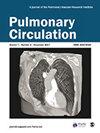Sex-related differences in pulmonary vascular volume distribution.
IF 2.2
4区 医学
Q2 CARDIAC & CARDIOVASCULAR SYSTEMS
引用次数: 0
Abstract
Pulmonary arterial hypertension affects females more frequently than males, and there are known sex-related differences in the lungs. However, normal sex-related differences in pulmonary vascular structure remain incompletely described. We aimed to contrast computed tomography-derived pulmonary vascular volume and its distribution within the lungs of healthy adult females and males. From the CanCOLD Study, we retrospectively identified healthy never-smokers. We analyzed full-inspiration computed tomography images, using vessel and airway segmentation to generate pulmonary vessel volume, vessel counts, and airway counts. Vessels were classified by cross-sectional area >10, 5-10, and <5 mm2 into bins, with volume summed within each area bin and in total. We included 46 females and 36 males (62 ± 9 years old). Females had lower total lung volume, total airway counts, total vessel counts, and total vessel volume (117 ± 31 vs. 164 ± 28 mL) versus males (all p < 0.001). Females also had lower vessel volume >10 mm2 (14 ± 8 vs. 27 ± 9 mL), vessel volume 5-10 mm2 (35 ± 11 vs. 55 ± 10 mL), and vessel volume <5 mm2 (68 ± 18 vs. 82 ± 19 mL) (all p < 0.001). Normalized to total vessel volume, vessel volume >10 mm2 (11 ± 4 vs. 16 ± 4%, p < 0.001) and 5-10 mm2 (30 ± 6 vs. 34 ± 5%, p = 0.001) remained lower in females but vessel volume <5 mm2 relative to total volume was 18% higher (59 ± 8 vs. 50 ± 7%, p < 0.001). Among healthy older adults, pulmonary vessel volume is distributed into smaller vessels in females versus males.肺血管容积分布的性别差异。
肺动脉高压对女性的影响比对男性的影响更大,而且肺部存在已知的性别差异。然而,肺血管结构的正常性别差异仍未得到完整描述。我们旨在对比计算机断层扫描得出的肺血管容量及其在健康成年女性和男性肺部的分布情况。我们从 CanCOLD 研究中回顾性地确定了从未吸烟的健康人。我们分析了全吸气计算机断层扫描图像,利用血管和气道分割生成肺血管容积、血管计数和气道计数。血管按横截面积 >10、5-10 和 10 平方毫米(14 ± 8 vs. 27 ± 9 mL)、血管容积 5-10 平方毫米(35 ± 11 vs. 55 ± 10 mL)和血管容积 10 平方毫米(11 ± 4 vs. 55 ± 10 mL)进行分类。女性的血管容积 10 平方毫米(11 ± 4 对 34 ± 5%,p < 0.001)和 5-10 平方毫米(30 ± 6 对 34 ± 5%,p = 0.001)仍然较低,但血管容积 <5 平方毫米相对于总容积高出 18%(59 ± 8 对 50 ± 7%,p < 0.001)。在健康的老年人中,女性与男性相比,肺血管体积分布在较小的血管中。
本文章由计算机程序翻译,如有差异,请以英文原文为准。
求助全文
约1分钟内获得全文
求助全文
来源期刊

Pulmonary Circulation
Medicine-Pulmonary and Respiratory Medicine
CiteScore
4.20
自引率
11.50%
发文量
153
审稿时长
15 weeks
期刊介绍:
Pulmonary Circulation''s main goal is to encourage basic, translational, and clinical research by investigators, physician-scientists, and clinicans, in the hope of increasing survival rates for pulmonary hypertension and other pulmonary vascular diseases worldwide, and developing new therapeutic approaches for the diseases. Freely available online, Pulmonary Circulation allows diverse knowledge of research, techniques, and case studies to reach a wide readership of specialists in order to improve patient care and treatment outcomes.
 求助内容:
求助内容: 应助结果提醒方式:
应助结果提醒方式:


